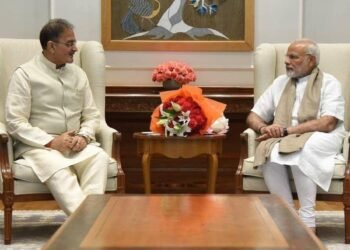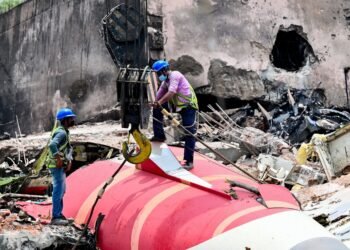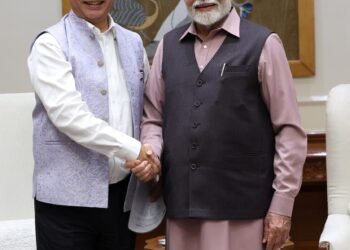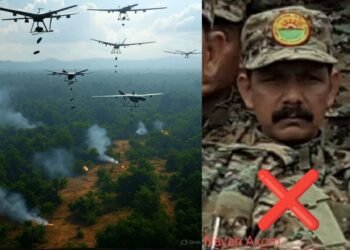The Views expressed are personal
Navin Upadhyay
Editor, PowerCorridors.in
By Jalhai Haokip (@hatjlahai)
The ongoing crisis in Manipur demands a resolution rooted in justice, not a superficial spectacle designed to placate the Meitei majority. The Kuki-Zo communities, who have borne the brunt of state-sponsored violence, deserve more than temporary reprieves or symbolic gestures. They have endured physical attacks, forced displacement, economic marginalization, property expropriation, and a systematic suppression of their identity. The psychological scars and social isolation inflicted by what can only be described as ethnic cleansing are profound and cannot be dismissed as mere communal friction. This is not a conflict between equal parties that can be resolved through disarmament and peace talks alone. There is a clear perpetrator-the state and its proxies and a clear victim, the Kuki-Zo people. Without criminal prosecution of those responsible, any “way forward” is an illusion.
Past developments had offered a glimpse of hope amid the chaos. The demarcation of buffer zones, separating the Kuki-Zo communities from their aggressors, has significantly reduced confrontations, shootouts, and killings. This suggests a critical truth: when the perpetrators are kept at bay, a semblance of normalcy can return. However, this is only a stopgap measure. A ceasefire or temporary separation is not a solution-it merely postpones the persecution of the Kuki-Zo people. The long-term answer lies in formalizing these buffer zones into a system of separate administration, ensuring the Kuki-Zo communities can live free from state interference and fear. A permanent sense of security, not a fleeting ceasefire, must be the goal.
ALSO READ: Arambai Tenggol Claims Governor Assured No Separate Kuki-Zo Administration
Historical precedents support this approach. Around the world, ethnic persecution has been mitigated through power-sharing governments and robust protections for civil rights. Bosnia’s Dayton Agreement, for instance, established separate entities for warring ethnic groups, while South Africa’s post-apartheid framework prioritized reconciliation alongside accountability. Manipur could draw lessons from such models, ensuring the Kuki-Zo people have autonomy and representation, while perpetrators face justice through transparent legal processes.
Yet, the measures taken by the state since the imposition of President’s Rule (PR) in Manipur reveal a troubling disconnect. Rather than focusing on justice for victims, the government’s actions appear to shield armed militants engaged in terror activities. Take the so-called “disarmament” process, touted as a step toward restoring law and order. On the surface, it seemed promising until the details emerged. Groups like the Arambai Tenggol, implicated in violence, surrendered rusted single-barrel guns and outdated arms, a far cry from the sophisticated weaponry looted from state armories.
Reports indicate that over 6,000 weapons were snatched in the Imphal Valley alone, including AK rifles, Insas rifles, light machine guns, pistols, and carbines, along with tens of thousands of rounds of ammunition. The Times of India documented the scale of the theft: on May 4, a mob of 5,000 looted four armories at the Manipur Police Training College, taking 157 Insas rifles, 54 SLRs, 34 carbines, 22 Insas LMGs, and 19 pistols, among others.
In contrast, the surrender of a mere 300 arms if that figure is even accurate represents just 0.05% of the looted arsenal. Calling this “disarmament” is not just an overstatement; it’s a mockery. The Manipur police don’t even use single-barrel guns, raising questions about the origins of the surrendered weapons. This charade suggests a deliberate attempt to grant immunity to criminals rather than disarm them. A genuine disarmament process, targeting the full scope of looted weaponry and holding perpetrators accountable, is essential to restoring order. Anything less undermines the rule of law and emboldens those who thrive on violence.
ALSO READ: Manipur’s Missing Arsenal: Single-Barrel Rifles Returned, AK-47s Kept
The way forward for Manipur hinges on three pillars: accountability, autonomy, and authenticity. First, the state must prosecute those responsible for the violence, from the mobs who looted armories to the officials who enabled or ignored the chaos. Independent investigations, possibly overseen by a national or international body, could ensure impartiality. Second, the Kuki-Zo people need a formalized separate administration, with control over their lands, resources, and governance, free from the state government’s overreach. This could take the form of a federally recognized autonomous region, safeguarding their rights and identity. Third, any disarmament effort must be authentic: tracking and recovering the thousands of looted weapons, not staging photo ops with obsolete guns.
Manipur’s crisis is not intractable, but it requires courage and clarity. Appeasing one group at the expense of another will only deepen the wounds. Justice for the Kuki-Zo victims, coupled with structural reforms, offers the only viable path to peace. The buffer zones have shown what’s possible; now, the state must commit to making that possibility permanent. Anything less is a betrayal of both the victims and the very idea of a just society.













